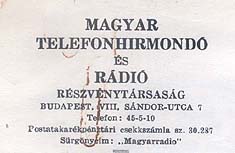"It is inconceivable that we should allow
so great a possibility for service
to be drowned in advertising chatter."
-Herbert Hoover, (1922 then Secretary of Commerce)
During the "broadcasting boom" of 1922, most radio programming was commercial-free. Most stations were amatuer, those that werent' were typically used as a promotion platform. It was then, that people began wondering how to pay for all this. Early on "scambled" broadcasts were even considered to create a subscriber base. [where do we se that now?] In early 1922, AT&T began promoting the controversial idea of using advertising to finance programming. Initially AT&T claimed it had a patent on the idea of radio advertising. They attempted to establish a monopoly over radio advertising. AT&T claimed that 479 of the then 500 radio station in america were violating their "patent." The first test case was a 1924 lawsuit against WHN-AM. In the end everyone just paid AT&T a damn fee.
 There was one example prior to this. On the subscription-based wire service Budapest Telefon Hirmondó, which began operation in 1893, received money for reading short commercials.
There was one example prior to this. On the subscription-based wire service Budapest Telefon Hirmondó, which began operation in 1893, received money for reading short commercials.It was in 1922 that 660 WEAF-AM was paid to air a ten- minute speech about the Queensborough Corporation, a real-estate concern. It was the first radio commercial. By 1923 WEAF was selling airtime direct to sponsors. Amateur stations immediately began complaining about the commercialization of the airwaves. Actual text here of the ad here:
http://earlyradiohistory.us/1922haw.htm
There if of course some evidence that other stations had previously sold airtime to commercial buyers. These are amatuer stations so these are more akin to underwriting.
1. Jersey City, NJ amateur station, 2IA, to the Jersey Review in May, 1920, charging $35 for twice-a-week broadcasts. This station was also reportedly rented out, for $50, to a second newspaper, the Jersey Journal, for a one-hour New Year's broadcast on January 1, 1922.
2. Medford Hillside, MA in 1921 station, 1XE reportedly received money for reading stories from the Little Folk's Magazine and Youth's Companion.




No comments:
Post a Comment